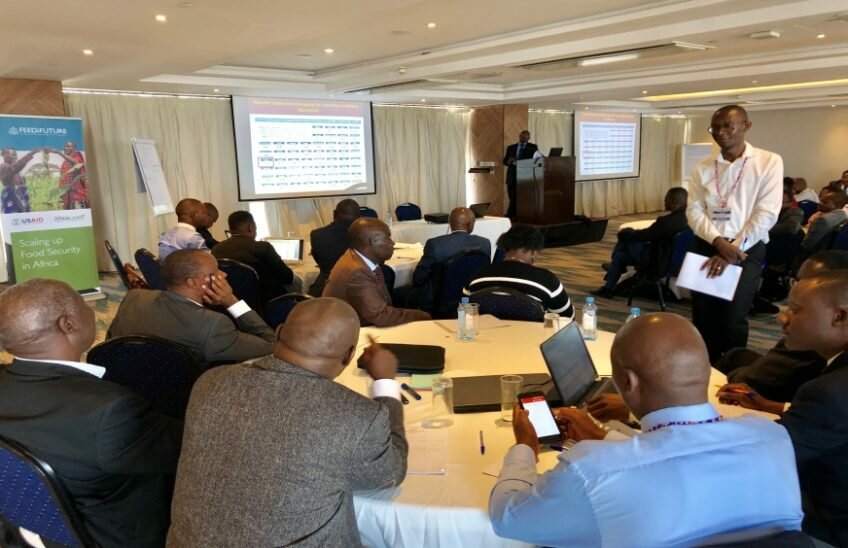Stakeholders from Kenya’s agriculture sector came together in mid-April to kickoff Kenya’s effort to collect data for and complete the second Biennial Review (BR) process of the Malabo Commitments and the African Union’s Comprehensive Africa Agriculture Development Programme (CAADP). During the first BR in 2017, which was completed by 47 of 55 African states, Kenya achieved a score or out 4.7 of 10. This score, which was released as part of the AU’s 2018 BR report, indicated that Kenya was “on track” to achieve the Malabo goals by 2025 along with 19 other countries. The 55 AU member states as a whole were found to be “not on track” to achieve Malabo Commitments. The second BR process includes improvements to the process and involves countries reporting on 47 specific indicators. The individual country data reporting process concludes in August of 2019, with the final report being released in January 2020.
Hosted by Kenya’s Ministry of Agriculture, Livestock, Fisheries and Irrigation (MoALF), and facilitated by Africa Lead and the program’s CAADP Advisor Robert Ouma, the event brought together 70 participants drawn from national and county governments, donor organizations, civil society, and the private sector. The purpose of the event was for participants to agree on a final country roadmap for Kenya’s BR reporting process, discuss data needs for BR reporting and allocate data collection responsibilities amongst stakeholders, and initiate the data collection process.
Isaiah Okeyo, MoALF and Kenya’s CAADP Focal Point kicked off the event. He was joined in opening remarks by Joseph Karugia, ReSAKSS-ECA, Michael Nicholson of USAID Kenya and East Africa, and remarks from Kenya’s Principal Secretary (PS) at the Dept. of Crop Development. In the remarks delivered, the PS said that agriculture as the backbone of the country’s economy must have a clear policy direction for agriculture, livestock and fisheries. His remarks underlined that agriculture plays a major role in Kenya’s “Big 4 Agenda”, with a focus on food security and nutrition.
As part of the technical sessions, participants were informed about the steps for completing the 2019 BR process. Participants received the revised indicators and the reporting templates, with an understanding that the outcomes of the workshop would feed directly into Kenya’s 2019 BR submission. Participants learned how to report on resilience through the RIMA model, why the new, African Food Safety Index (AFSI) indicator was important, and how post-harvest losses are calculated. Additional presentations focused on preparing a Kenya road map, the responsibilities for report components, data sources on a thematic basis and the way forward as a group.
As a result of presentations and discussions, key points emerged related to the reporting process itself. Specifically participants discussed issues of data quality, collection and management, gaps in capacity for quality data collection. Meeting participants indicated that Kenya should explore a peer reviewed county reporting mechanism to elicit improved data from the sub-national level. In the near term it was recommended that closer engagement with the private sector across the 47 counties would enhance baseline data, indicators for tracking change, and a better quality BR reporting process.
During the course of the event concerns were raised about improving agriculture policy in the country. Highlights included the fact that Kenya had not reached the goal of 10% public spending on agriculture, the need to boost access to credit for small scale producers, the need for improved performance and delivery in the food and nutrition sub-sectors, and stricter regulations related to food safety. It was also noted the MoALF was generally under-resourced to complete the BR process and commitment from stakeholders was essential to complete the process.
As a result of the road map process undertaken during the meeting, MoALF was able to gain a number of new commitments from stakeholders to contribute to the BR process at the national and county levels. These included the Society of Crop, Agribusiness Advisors (SOCCA), a private sector entity which will contribute on food safety tracking and private sector investment data monitoring. World Vision and the Resilience Consortium agreed to contribute to resilience reporting. The African Women in Agricultural and Research Development (AWARD) was identified to help provide data on women in agriculture. At the county level the Departments of Agriculture, agreed to support gender-disaggregated data collection. Finally, the Association of Micro-Finance Institutions (AMFI) will push for improved access to finance for small scale producers, as well as the Agricultural Finance Corporation and banks and GODAN on youth in and women in agribusiness.
Kenya’s CAADP Focal Point and MoALF will be leading the BR data collection process and other action items outlined in the road map developed during the event.
